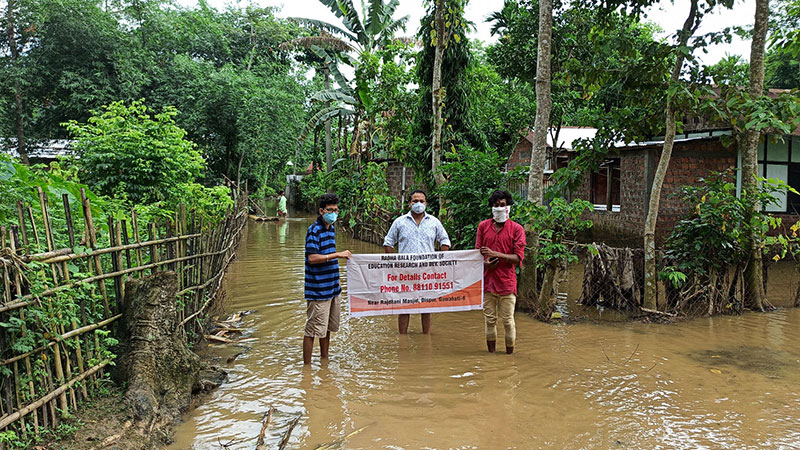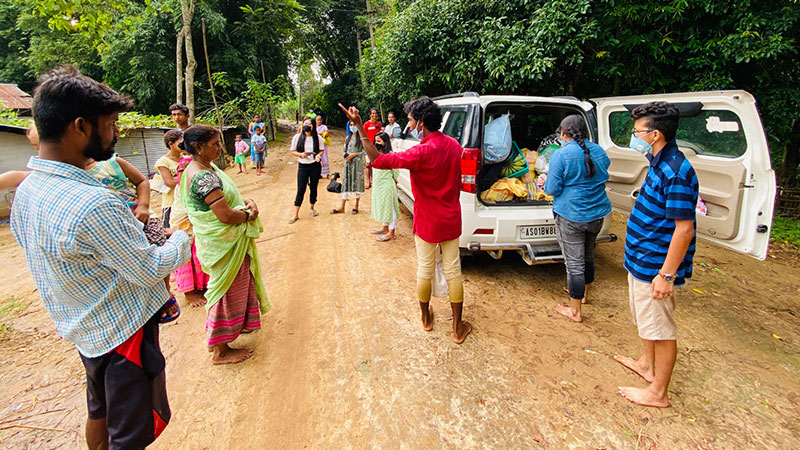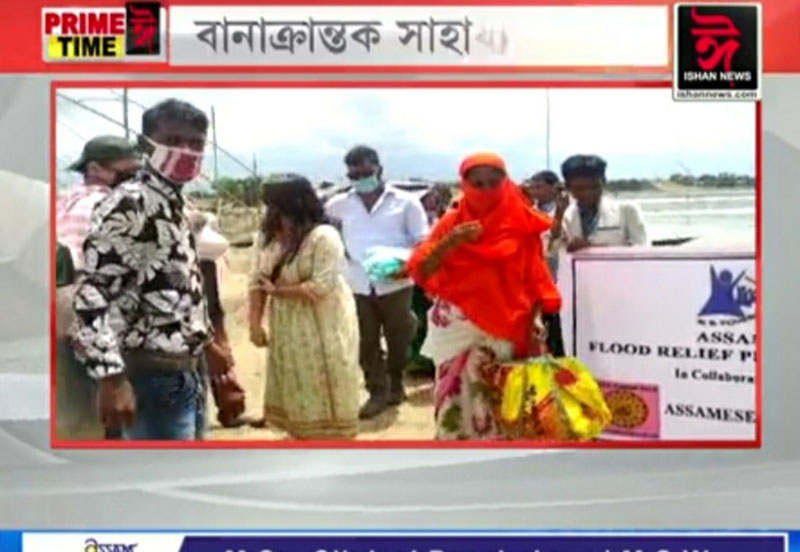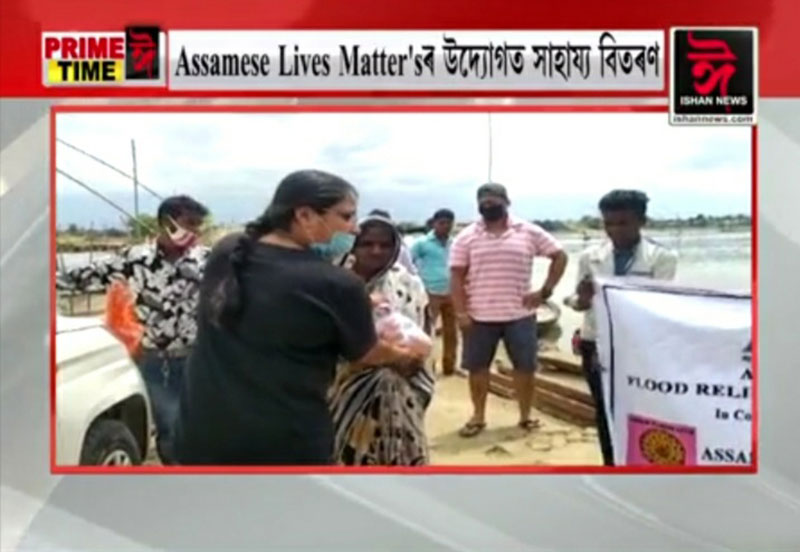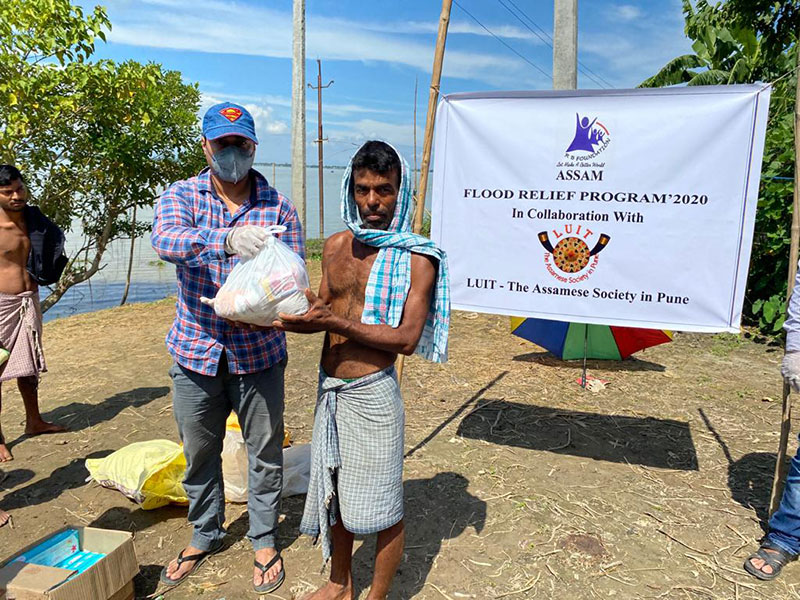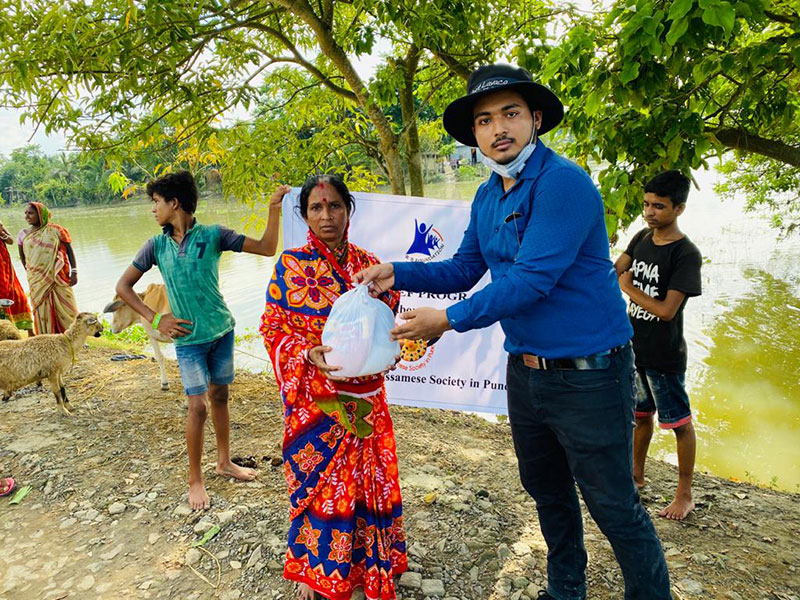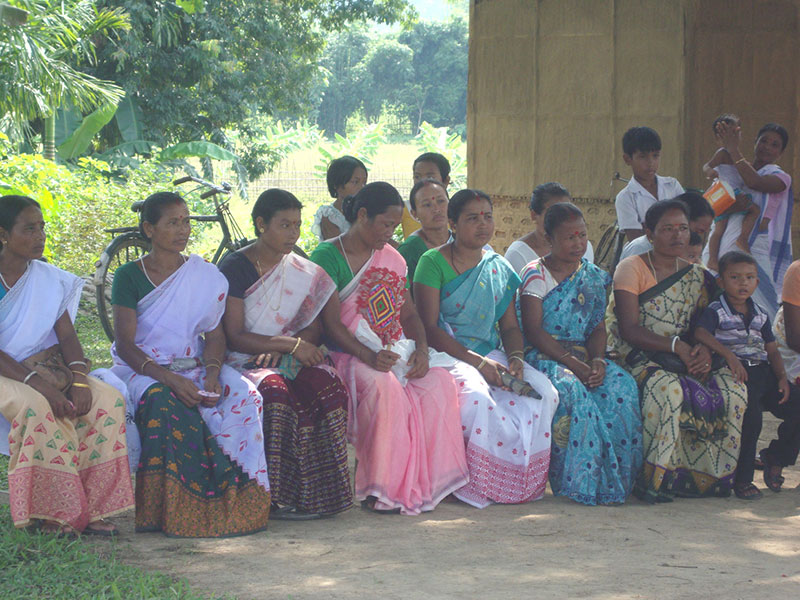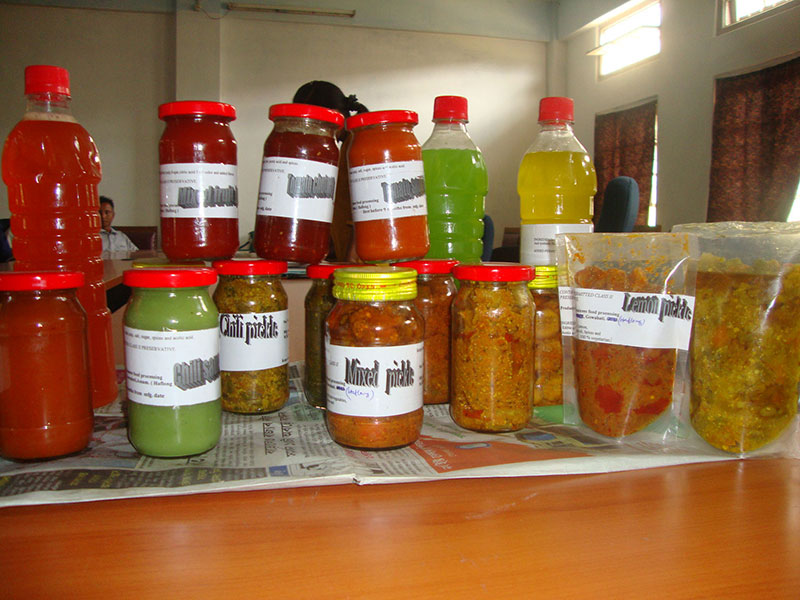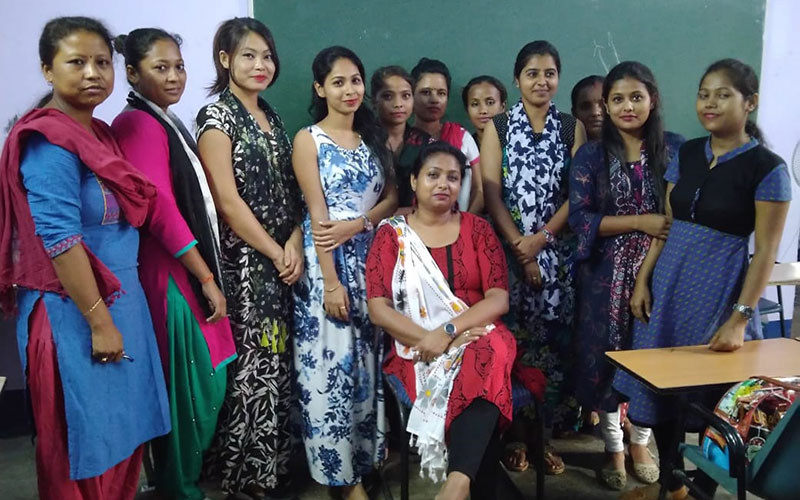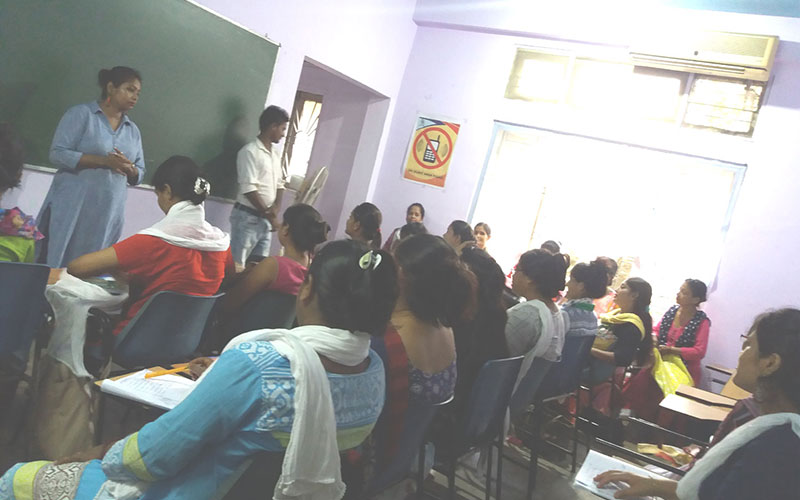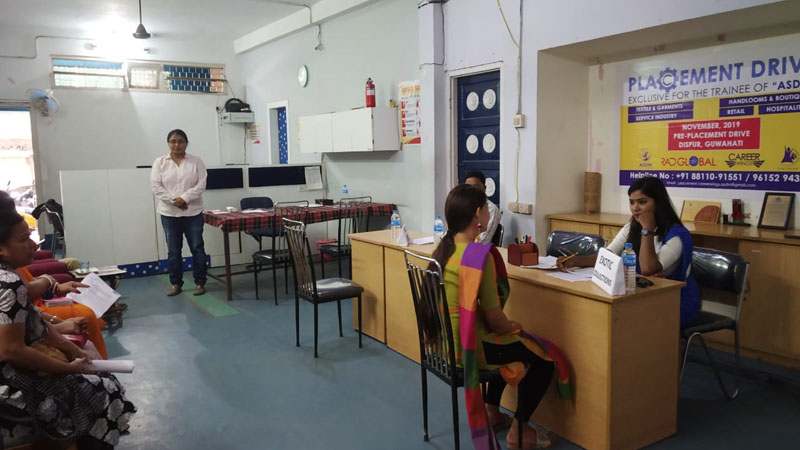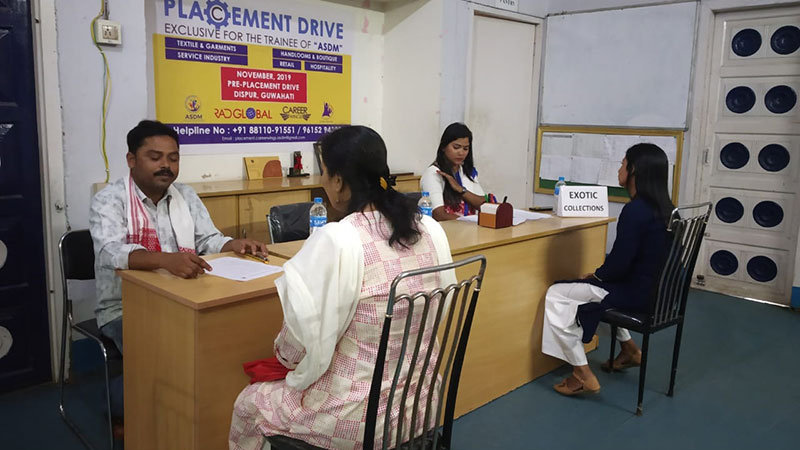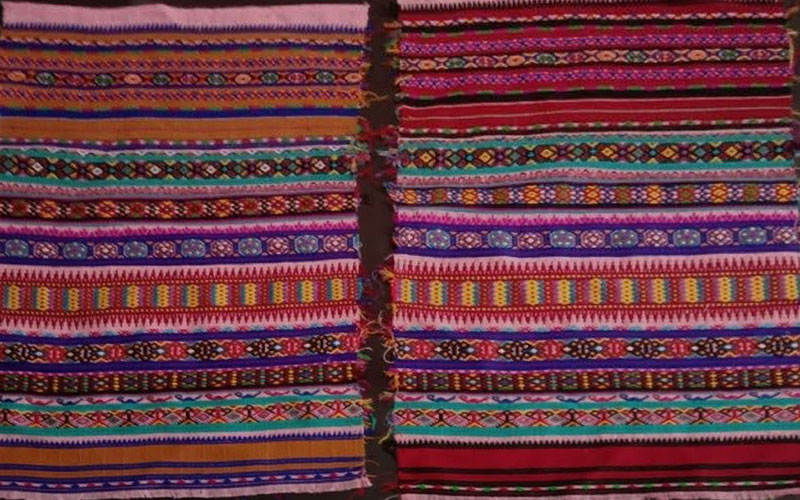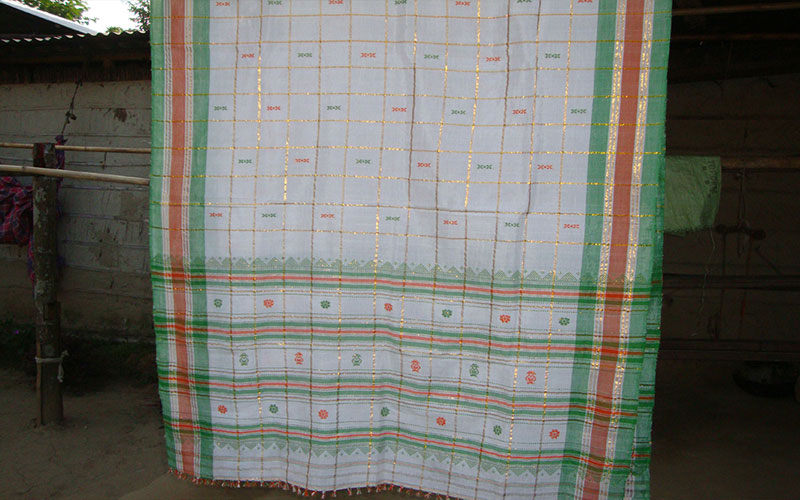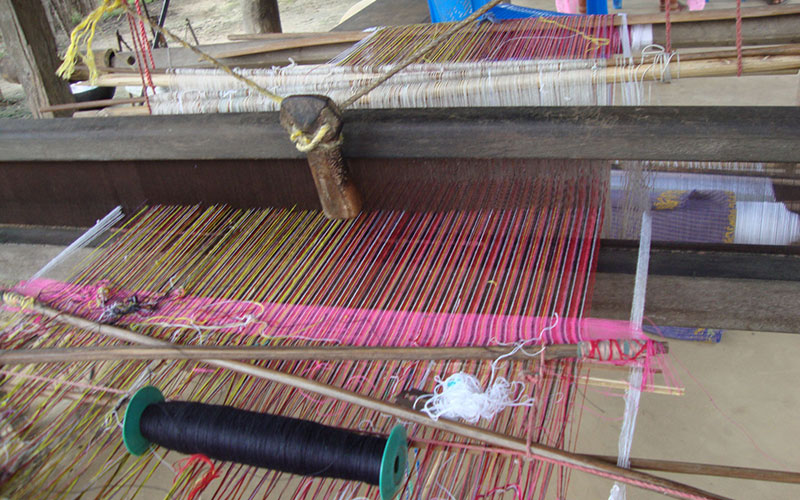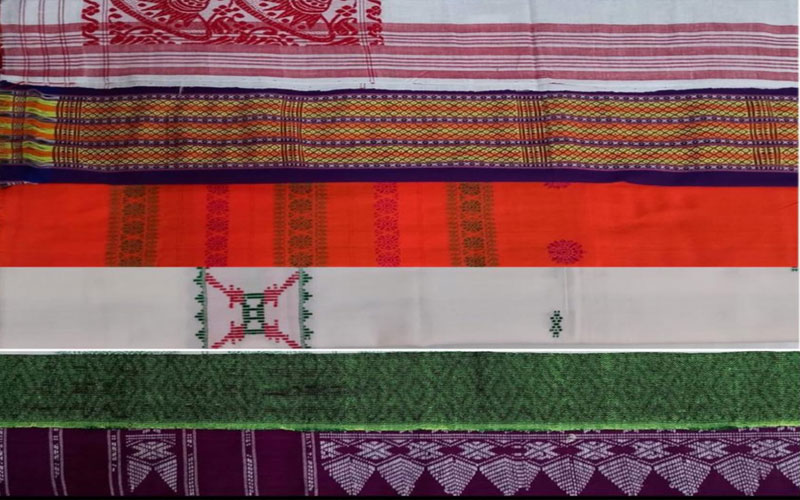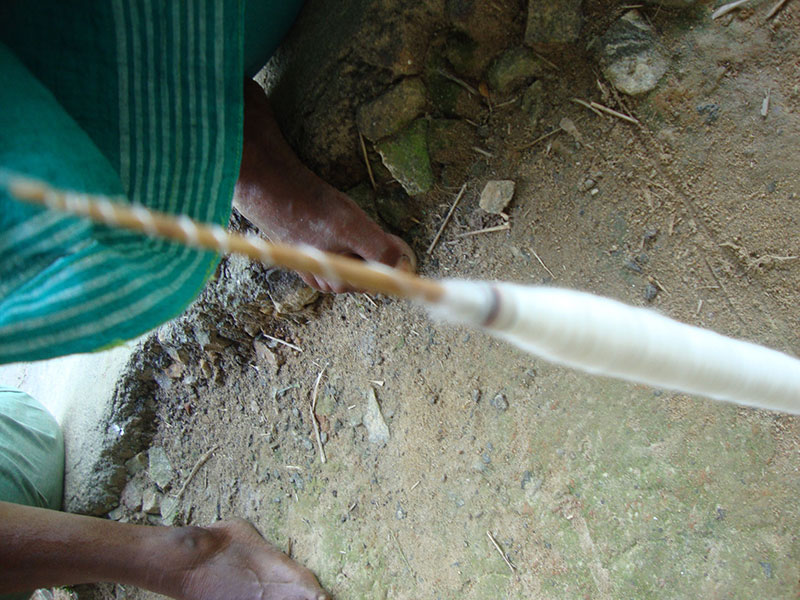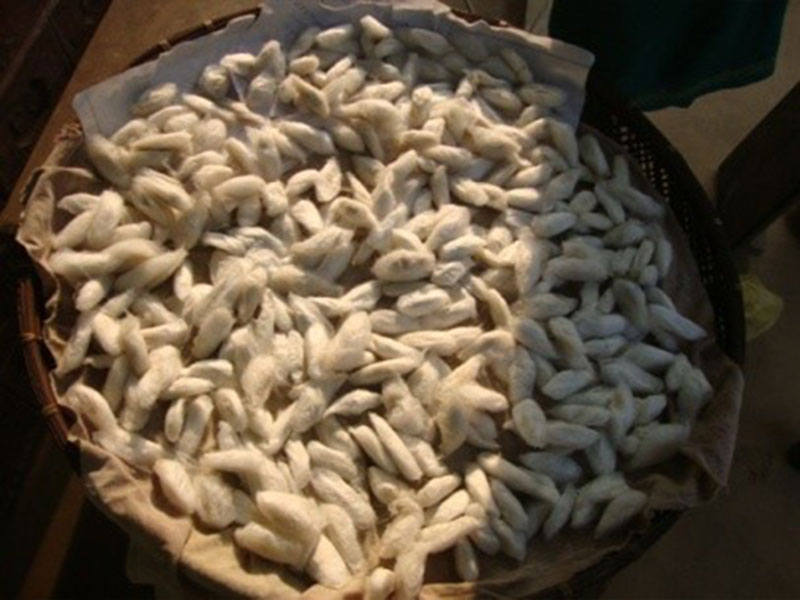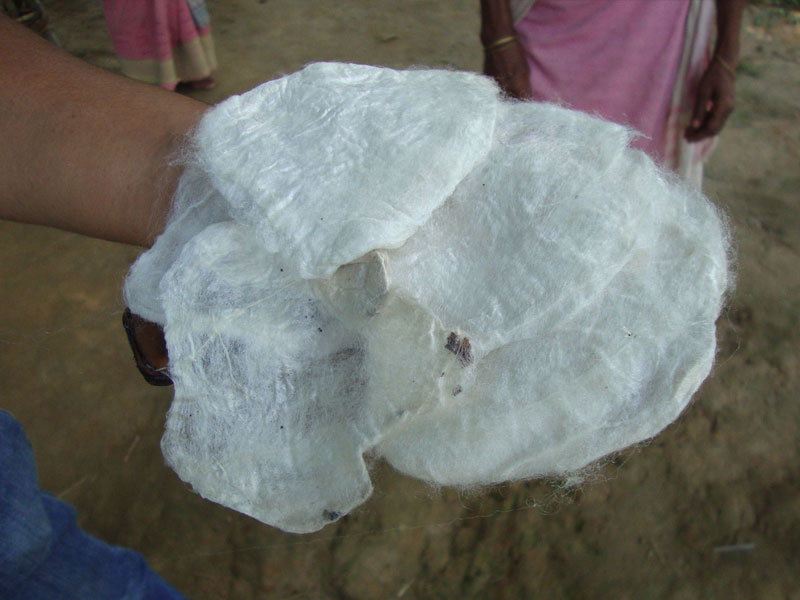WORKSHOP AND TRAINING
1. FLOOD RELIEF CAMP
According to the latest update by Assam State Disaster Management Authority 24 districts of Assam- Dhemaji, Lakhimpur, Biswanath, Darrang, Baksa, Nalbari, Barpeta, Chirrang, Bongaigaon, Kokrajhar, Dhubri, South Salmara, Goalpara, Kamrup, Kamrup Metro, Morigaon, Nagaon, Golaghat, Jorhat, Majuli, Sivsagar, Dibrughar, Tinsukia and Cachar – are reeling under floods affecting alter thought 24,19,185 people in 2,323 village under 69 revenue circles.
Due to the floods many people have lost their lives, loved ones, homes, and livelihood.
The Radha Bala Foundation has stepped in to provide food to affected people in Assam through tie-up with local NGO’s and organizations.
A) Flood Relief Collaboration with HWC (Humanity Welfare Council) :-
Radha Bala Foundation in Collaboration with Humanity Welfare Council (HWC) had distributed flood relief packet to 50 families of kamrup (Rural) district, namely Kahuwa and Nahira.
With great pleasure, I express my sincere thanks to Humanity Welfare Council HWC for entrusting us and to choosing us to be partners in the mission to provide essential relief items to the affected people of Assam due to flood, I am also thankful to those who helped me directly and indirectly to complete this fieldwork and to make it this mission a success.
When the individuals were asked to share an opinion on the mission, one of the most gripping interactions in our mission was “These relief items have provided us reassurance in this time of darkness, we do not have to worry for the next few days for survival. You have provided us courage to live our lives”.
Together we were able to affect lives for a greater good of humanity.
B) Flood Relief Collaboration with Assamese Lives Matter :-
Our second Flood Relief Activity in collaboration with Assamese Lives Matter was conducted on 08 Aug 2020. We have distributed relief packages to 150 families of Hatishala Village, South Kamrup District, Assam.
We as an organisation thank you and your team “Assamese Lives Matter” for supporting the relief of our fellow citizens who have been severely impacted by Assam Flood 2020 and for committing resources that will enable the affected humanitarians to stay and deliver.
C) Flood Relief Collaboration with LUIT- The Assamese Society in Pune :-
Our Third Flood Relief program in collaboration with LUIT- The Assamese Society in Pune.
LUIT- “The Assamese Society in Pune” has supported Flood Relief to 180 affected families under Mayong Sub-division of Morigaon district which has brought smiles on many faces, and we are grateful to you for the same.
2. COVID-19 RELIEF CAMP ORGANIZED BY HUMANITY WELFARE COUNCIL DELHI AND RADHA BALA FOUNDATION
During the rising cases in Assam due to COVID-19 pandemic, the Humanity Welfare Council of Delhi organized a relief camp in Guwahati City in collaboration with Radha Bala Foundation of Guwahati.
The relief was provided to the poor people as their normal life and daily income path got hit by the pandemic and also due to ongoing curfew in the city.
The team of Humanity Welfare Council and Radha Bala Foundation jointly organized a relief camp at Panjabari and Ahomgaon under Project Global Care.
Commodities like rice, pulses, onions, potatoes, salt, edible oil were distributed among the needy people.
Masks and sanitizers were also distributed among the people as Radha Bala Foundation have provided emotional and psychological support to the affected people to overcome the effect of lockdown and pandemic.
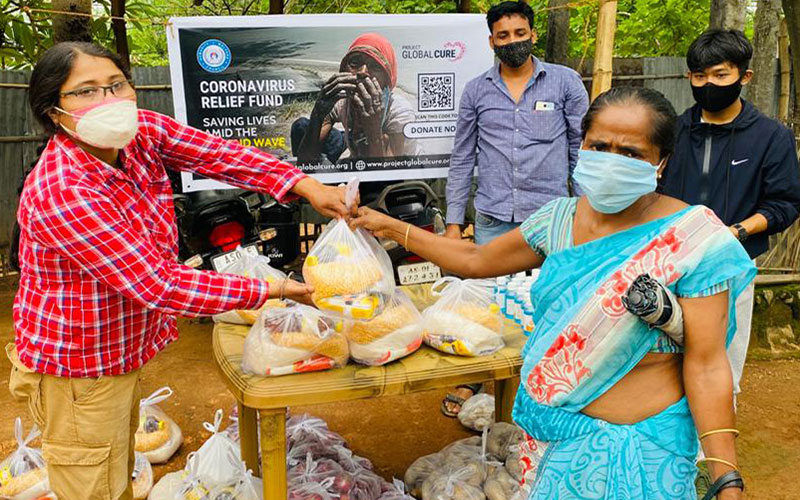
3. MAKEUP COMPETITION
RadhaBala Foundation has conducted Self Makeup Competition at Uporhali Centre for the ongoing Makeup Artist students. 82 students has participated in this competition. This competition motivated the students for being self-employed through earn with their skills. This is an opportunity to showcased their talent also.
4. ONLINE CLASS FOR COMPETITIVE EXAM
Conducted online training for 1000 nos. of students for APSC exam. The programme was sponsored by Directorate of Sports and Youth Welfare, Govt. of Assam. This programme was a very successful one in this pandemic time.
5. SUPPORTING SELF HELP GROUP (SHG) IN VARIOUS ACTIVITIES
Radha Bala Foundation encourage women in the local area of rural areas to form into a Self-Help group (SHG) of about 7-13 members. The SHG’s are usually informal groups of a locality or area, whose members have a common need and importance towards collective action. The main purpose of SHG’s is to mobilize savings among their members and used resources to meet the emergent credit needs of the members of the group.
We are providing Skill training programs to promote leadership qualities and income generating activities.
Radha Bala Foundation also form an acceptable level of financial and administrative discipline in running of the SHG. The members of the group can take small loan to meet their needs on low interest rate. Radha Bala Foundation guide the members to pool their savings on regular basis, if the savings are regular, after some time, the group can get loans from the banks. Through Radha Bala Foundation we are focusing in the areas like awareness, motivation, leadership, community development training for the SHG’s.
1. CAPACITY BUILDING OF WOMEN AND YOUTHS
To empower and build capacity of economically active poor women and youth by providing them with training in various Skills such as IT, Crafts, food processing, jute production etc or enhance their capacities in getting employed and start their own enterprises.
Empowerment is a process whereby women and youth gain the ability to make independent choices over their activities and control resources, become self-reliant and overcome subordination. Empowerment not includes increase in women’s level of income, but control over income and assets and participation in connectivity and household decisions. A woman is truly empowered if she can enhance her confidence and status within her family as independent producers of wealth and provider of finance to her household.
These trainings have greatly capacited the women and youths. Most of them are now successfully employed or doing successful business.
2. SOFT SKILLS AND PERSONALITY DEVELOPMENT
Soft skills comprise pleasant and appealing personality traits as self-confidence, positive attitude, emotional intelligence, social grace, flexibility, friendliness and effective communication skills.
Effective communication and interpersonal skills are crucial to increase employment opportunities and to compete successfully in the business environment. The real key to the effectiveness of professionals is their ability to put their domain knowledge into effective practice. soft skills have a crucial role to play. If future managers know how to deal with people at the emotional level through Emotional Intelligence, they can build and sustain effective relationships that will result in mutual gain.
Radha Bala Foundation has conducted soft skills training through renowned resource person Mrs. Nilakshi Dutta, for students to develop their personality and upgrade their communication and presentation skills. The training benefits the students, both in their early professional careers and in their social interactions in the business environment.
The training classes helps them in building and improving their skills in communication, the effective use of English, business correspondence, presentations, team building, leadership, time management, group discussions, interviews, and inter-personal skills.
3. PLACEMENT DRIVE
A campus placement drive was conducted for the trained candidate of Sewing Machine Operator at our training Centre, Radha Bala Foundation, Guwahati on 16th September’ 2019.
4 students was selected from that drive. We congratulate them on their achievement and wish them all the best for future life.
4. TRAINING ON MUSHROOM CULTIVATION TO SHG / INDIVIDUALS
Mushroom farming is one of the most profitable agri-business that you can start with a low investment and less space. Mushroom cultivation in India is growing gradually as an alternative source of income for many people.
Climate of Assam is suitable for mushroom cultivation and agro wastes are abundantly available which can be used as a raw material. Mushroom cultivation does not require much land and it is mostly an indoor activity which makes it more suitable for woman SHG members. Proper training on mushroom production to the farmers, training on spawn production and marketing of mushroom will help to leverage the available resources.
In the Rani block under Kamrup rural we are engaging farmers on production of Oyster Mushroom. The programme will adopt an income enhancement based approach. As a core focus of the programme, each intervention under the initiative will be specifically designed to increase the productivity of their land thereby increasing the income of the SHG members.
5. HANDLOOM DESIGN DEVELOPMENT WORKSHOP
Weaving and embroidery is one of the main cottage industries of Assam. It is said that, Assamese women can weave dreams in silk! That’s so true. Weaving is a traditional industry of Assam. Assamese women mostly use weaving as a part-time occupation or hobby. They usually produce cloth to meet the requirement of their family. The beautiful handloom fabric of Assam shows the creativity of Assamese weavers. Cotton, Muga silk, Paat (Silk), Eri silk are common fabrics widely used for weaving in Assam. Sualkuchi is one of the main handloom weaving centres of Assam.
Handloom industry is a rural based cottage industry, in which spinning, weaving and other processes were done only by hand. Handloom industry not only provides the basic necessities of life but also plays a vital role in economic growth of a country through its contribution to employment generation, industrial output, and the export earnings. Weavers can play an important role in boosting the economy of Assam. And Assam is the rich culture on Handloom work.
Handloom Design Development workshop is provided in the Radha Bala Foundation, Birpara, Boko Centre to the trainee Artisans. It is a 10 days workshop programme. Design development in Graphs is taught in manual form in this centre along with colour matching. The method of manual card punching for weaving out the designs through Jacquard attachment is taught with practical training.
We have employed women from all kind of background and also engage Youths with a sole motive to pass on the knowledge to the younger generation and also strengthen our economy by bringing in more business in the states to address the mass migration of the rural populations to the city. The organization is involved in developing new and modernized designs for fabrics with different combinations of colour matching. It also works on preservation of age old design motifs of different tribes in the State.
1. SERICULTURE ACTIVITIES
Sericulture is an agro-based industry. Sericulture is the process of cultivating of silkworms and extracting silk from them. The caterpillars of the domestic silk moth are the most commonly used silkworm species in sericulture. Sericulture is now a very important domestic industry. The silkworm litter is used for bio-gas production and used as a fuel for cooking in the rural area. Thus sericulture not only provides silk for fashionable clothing’s, it also provides several very useful bye products to the human society. It involves rearing of silkworms for the production of raw silk, which is the yarn obtained out of cocoons spun by certain species of insects. The major activities of sericulture comprises of food-plant cultivation to feed the silkworms which spin silk cocoons and reeling the cocoons for unwinding the silk filament for value added benefits such as processing and weaving. Man is always inquisitive for silk products. SILK – The Queen of textiles, spells luxury, elegance, class and comfort.
Assam’s handloom industry is basically silk oriented. Four varieties of silk worms and their host plants, Mulberry, Eri, Muga and Oak Tassar are popular and important for economic and commercial purposes.
Silk has exquisite qualities like the natural sheen, inherent affinity for dyes and vibrant colours, high absorbance, light weight, resilience and excellent drape etc. which have made silk, the irresistible and inevitable companion of the eve, all over the world.
Assam is a leading Silk producing State. It has a virtual monopoly in Muga and the dominate share in Eri Silk. Thus, the importance of Eri Silk Rearing cannot be neglected. R B FOUNDATION took the initiative to make people aware of the market potentiality of Eri Silk Rearing. After our ample research, we spotted Kulsi forest villages as the best area for our purpose.
In Kahuwa, which is located in the Chayygaon Revenue Circle under Kamrup Rural District every household is engage in Eri Silk Rearing Process, but due to lack of financial support and technology up gradation they could not proceed as per their capacity. So, to gear up unemployed youth and women of these villages R B FOUNDATION carried out a necessary skill based training and workshops on Sericulture, Horticulture, Handlooms and Handicrafts in all other 8 villages time to time.
After on the basis of that meeting the Department has decided to give grants to 25 nos. of beneficiaries for developing Eri Rearing House among 10 nos. of ST villages.
2. FISH FARMING TRAINING WORKSHOP
Free scientific training to the unemployed people from low-income category towards enabling them for self-employment and a steady source of livelihood from Goroimari area under Chhaygaon Revenue Circle. Their engagement involves right from training to setting up the farm and to maintain. We also help farmers who run an independent fishery by using technology to breed a gamut of local fish varieties. Already in this area many families are involved in Fish farming to live their livelihood.
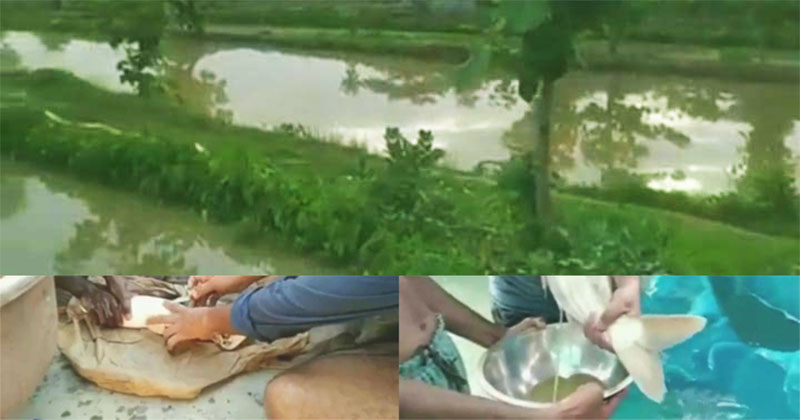
We aware the farmers for different schemes like – Remunerative Approaches for Agriculture and Allied Sector Rejuvenations (RKVY- RAFTAAR) scheme.

